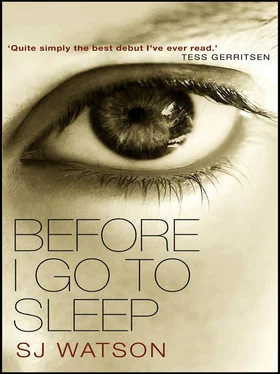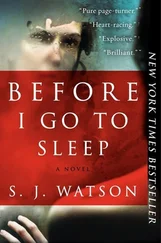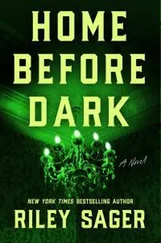S. Watson - Before I Go to Sleep - A Novel
Здесь есть возможность читать онлайн «S. Watson - Before I Go to Sleep - A Novel» весь текст электронной книги совершенно бесплатно (целиком полную версию без сокращений). В некоторых случаях можно слушать аудио, скачать через торрент в формате fb2 и присутствует краткое содержание. Год выпуска: 2011, Жанр: Триллер, на английском языке. Описание произведения, (предисловие) а так же отзывы посетителей доступны на портале библиотеки ЛибКат.
- Название:Before I Go to Sleep: A Novel
- Автор:
- Жанр:
- Год:2011
- ISBN:нет данных
- Рейтинг книги:3 / 5. Голосов: 1
-
Избранное:Добавить в избранное
- Отзывы:
-
Ваша оценка:
- 60
- 1
- 2
- 3
- 4
- 5
Before I Go to Sleep: A Novel: краткое содержание, описание и аннотация
Предлагаем к чтению аннотацию, описание, краткое содержание или предисловие (зависит от того, что написал сам автор книги «Before I Go to Sleep: A Novel»). Если вы не нашли необходимую информацию о книге — напишите в комментариях, мы постараемся отыскать её.
Before I Go to Sleep: A Novel — читать онлайн бесплатно полную книгу (весь текст) целиком
Ниже представлен текст книги, разбитый по страницам. Система сохранения места последней прочитанной страницы, позволяет с удобством читать онлайн бесплатно книгу «Before I Go to Sleep: A Novel», без необходимости каждый раз заново искать на чём Вы остановились. Поставьте закладку, и сможете в любой момент перейти на страницу, на которой закончили чтение.
Интервал:
Закладка:
‘“Their own good”?”
‘Yes. They’re a danger either to themselves or to others. They need to be kept secure.’
We carried on walking. A woman looked up as I passed her room, and though our eyes made contact hers betrayed no expression. Instead she slapped herself, still looking at me, and when I winced she did it again. A vision flitted through me — visiting a zoo as a child, watching a tiger pace up and down her cage — but I pushed it away and carried on, resolving to look neither left nor right.
‘Why did they bring me here?’ I said.
‘Before you were here you were in the general medical ward. In a bed, just like everybody else. You would spend some weekends at home, with Ben. But you became more and more difficult to manage.’
‘Difficult?’
‘You would wander off. Ben had to start locking the doors to the house. You became hysterical a couple of times, convinced that he had hurt you, that you were being locked in against your will. For a while you were OK when you got back to the ward, but then you started demonstrating similar behaviours there, too.’
‘So they had to find a way of locking me in,’ I said. We had reached a nursing station. A man in uniform sat behind a desk, entering something on a computer. He looked up as we approached and said the doctor would be with us soon. He invited us to take a seat. I scanned his face — the crooked nose, the gold-studded earring — hoping something would ignite a glimmer of familiarity. Nothing. The ward seemed utterly foreign.
‘Yes,’ said Dr Nash. ‘You’d gone missing. For something like four and a half hours. You were picked up by the police, down by the canal. Dressed only in pyjamas and a gown. Ben had to collect you from the station. You wouldn’t go with any of the nurses. They had no choice.’
He told me that right away Ben began to campaign to have me moved. ‘He felt that a psychiatric ward was not the best place for you. He was right, really. You weren’t dangerous, either to yourself or to others. It’s even possible that being surrounded by those who were more ill than you was making you worse. He wrote to the doctors, the head of the hospital, your MP. But nothing was available.
‘And then,’ he said, ‘a residential centre for people with chronic brain injuries opened. He lobbied hard, and you were assessed and thought to be suitable, though funding was an issue. Ben had had to take a break from work to look after you and couldn’t afford to fund it himself, but he wouldn’t take no for an answer. Apparently he threatened to go to the press with your story. There were meetings and appeals and so on, but eventually he was successful and you were accepted as a patient, with the state agreeing to pay for your stay for as long as you were ill. You were moved there about ten years ago.’
I thought of my husband, tried to imagine him writing letters, campaigning, threatening. It didn’t seem possible. The man I had met that morning seemed humble, deferential. Not weak, exactly, but accepting. He didn’t seem like the kind of person to make waves.
I am not the only one, I thought, whose personality has changed because of my injury.
‘The home was fairly small,’ said Dr Nash. ‘A few rooms in a rehab centre. There weren’t many other residents. Lots of people to help look after you. You had a little more independence there. You were safe. You made improvements.’
‘But I wasn’t with Ben?’
‘No. He lived at home. He needed to carry on working, and he couldn’t do that and look after you. He decided—’
A memory flashed through me, tearing me suddenly back into the past. Everything was slightly out of focus and had a haze around it, and the images were so bright I almost wanted to look away. I saw myself, walking through these same corridors, being led back towards a room that I dimly understood as mine. I am wearing carpet slippers, a blue gown with ties up the back. The woman with me is black, wearing a uniform. ‘Here you go, hon,’ she says to me. ‘Look who’s here to see you!’ She lets go of my hand and guides me towards the bed.
A group of strangers are sitting around it, watching me. I see a man with dark hair and a woman wearing a beret, but I can’t make out their faces. I am in the wrong room, I want to say. There’s been a mistake. But I say nothing.
A child — four or five years old — stands up. He had been sitting on the edge of the bed. He comes towards me, running, and he says Mummy and I see that he is talking to me, and only then do I realize who he is. Adam . I crouch down and he runs into my arms, and I hold him and kiss the top of his head, and then I stand. ‘Who are you?’ I say to the group around the bed. ‘What are you doing here?’
The man looks suddenly sad, the woman with the beret stands and says, ‘Chris. Chrissy. It’s me. You know who I am, don’t you?’ and then comes towards me and I see that she is crying.
‘No,’ I say. ‘No! Get out! Get out!’ and I turn to leave the room and there is another woman there — standing behind me — and I don’t know who she is, or how she got there, and I start to cry. I begin to sink to the floor, but the child is there, holding on to my knees, and I don’t know who he is, but he keeps calling me Mummy , saying it over and over again, Mummy, Mummy, Mummy , and I don’t know why, or who he is, or why he is holding me …
A hand touched my arm. I flinched as if stung. A voice.
‘Christine? Are you OK? Dr Wilson is here.’
I opened my eyes, looked around. A woman wearing a white coat stood in front of us. ‘Dr Nash,’ she said. She shook his hand, and then turned to me. ‘Christine?’
‘Yes,’ I said.
‘Pleased to meet you,’ she said. ‘I’m Hilary Wilson.’ I took her hand. She was a little older than me; her hair was beginning to turn grey, and a pair of half-moon glasses dangled on a gold chain round her neck. ‘How d’you do?’ she said, and from nowhere I felt certain I had met her before. She nodded down the corridor. ‘Shall we?’
Her office was large, lined with books, piled with boxes of spilling papers. She sat behind a desk and indicated two chairs opposite it, into which Dr Nash and I sank. I watched her take a file from the pile on her desk and open it. ‘Now, my dear,’ she said. ‘Let’s have a look.’
Her image froze. I knew her. I had seen her picture as I lay in the scanner, and, though I hadn’t recognized it at the time, I did now. I had been here before. Many times. Sitting where I am now, in this chair or one like it, watching her making notes in a file as she peered through the glasses held delicately to her eyes.
‘I’ve met you before …’ I said. ‘I remember.’ Dr Nash looked over at me, then back to Dr Wilson.
‘Yes,’ she said. ‘Yes, you have. Though not that often.’ She explained that she’d only just started working here when I moved out and that at first I wasn’t even on her caseload. ‘It’s certainly most encouraging that you remember me, though,’ she said. ‘It’s been a long time since you were resident here.’ Dr Nash leaned forward and said it might help me to see the room in which I’d lived. She nodded and squinted in the file, then after a minute said she didn’t know which it was. ‘It’s possible that you moved around a fair old bit, in any case,’ she said. ‘Many of the patients do. Could we ask your husband? According to the file he and your son, Adam, visited you almost every day.’
I had read about Adam this morning and felt a flash of happiness at the mention of his name, and relief that I’d seen a little of him growing up, but shook my head. ‘No,’ I said. ‘I’d rather not ring Ben.’
Dr Wilson didn’t argue. ‘A friend of yours called Claire seemed to be something of a regular too. How about her?’
Читать дальшеИнтервал:
Закладка:
Похожие книги на «Before I Go to Sleep: A Novel»
Представляем Вашему вниманию похожие книги на «Before I Go to Sleep: A Novel» списком для выбора. Мы отобрали схожую по названию и смыслу литературу в надежде предоставить читателям больше вариантов отыскать новые, интересные, ещё непрочитанные произведения.
Обсуждение, отзывы о книге «Before I Go to Sleep: A Novel» и просто собственные мнения читателей. Оставьте ваши комментарии, напишите, что Вы думаете о произведении, его смысле или главных героях. Укажите что конкретно понравилось, а что нет, и почему Вы так считаете.












